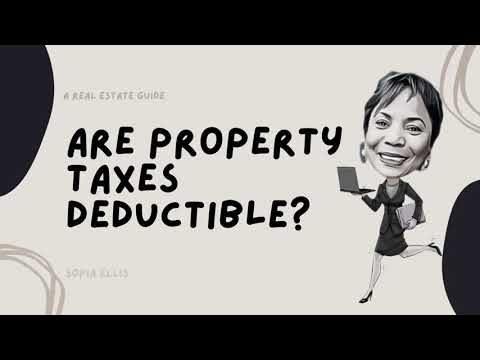Is Property Tax Deductible in 2024?
When it comes to managing your personal finances, especially as a homeowner or a real estate investor, understanding the ins and outs of tax deductions can feel like you’re navigating a labyrinth with a blindfold on. And one of the most compelling questions in this maze is: is property tax deductible? Let’s take a deep dive into the nitty-gritty of property tax deductions and unearth some surprising facts that could shake up your tax strategy in 2024.

Unpacking the Basics: What Does It Mean When We Ask “Is Property Tax Deductible?”
Before we spring into the details, let’s start with the basics. Property tax, also known as real estate tax, is levied on your real estate property by local governments and is often based on the property’s value. Now, tax deductions—these are like the silver linings of your tax universe; they reduce your taxable income.
In the ever-evolving tapestry of the tax code, understanding the prerequisites for deducting property taxes on your federal tax returns is tantamount to finding treasure. As of our current date in 2024, your deduction for state and local income, sales, and property taxes is capped at a combined total of $10,000—or $5,000 if you’re married and filing separately.

The Shocking Fact #1: How Recent Legislation Affects Whether Real Estate Taxes Are Deductible
Recent legislation has taken taxpayers on quite the roller coaster. For instance, the Tax Cuts and Jobs Act (TCJA) set that initial $10,000 cap, causing quite the stir amongst homeowners, especially those in high-tax states. Imagine, if you will, a homeowner in sunny California, where property tax valuations are as high as the state’s majestic redwoods, being limited to the same deduction cap as someone in a state with humbler tax assessments. Indeed, recent legislation has made a significant impact and, according to experts, this has led to a noticeable shift in taxpayer strategies.

| Criteria | Details |
|---|---|
| Eligibility | Must own the property and have paid the property taxes. |
| Deduction Limit | $10,000 for single or married filing jointly; $5,000 if married filing separately. |
| Tax Years Applicable | Guidance applicable for the current tax year and beyond, unless tax laws change. |
| Types of Taxes Deductible | Property taxes on main residences and other real estate owned. |
| Requirement to Deduct | Must itemize deductions on the tax return to claim the property tax deduction. |
| Restrictions | Cannot claim the property tax deduction if opting for the standard deduction. |
| Excess Payment | Amounts exceeding the $10,000 cap are not deductible. |
| Deduction Benefit | Reduces taxable income, potentially lowering tax liability. |
| Location Specifics | As of 2021 in California, the same $10,000 limit applies for federal income tax deduction; may vary by state. |
| Deductible Expenses | Includes mortgage interest and property taxes, among other expenses, up to specific limits when itemizing. |
| Additional Notes | Taxpayers subject to limitations on other itemized deductions may be affected. |
The Shocking Fact #2: Limitations on Deductible Amounts for Property Tax
Let’s talk numbers. Suppose you’re living in a swanky part of Texas with sky-high property taxes. You’re shelling out more than $10,000 annually on these taxes alone. Here’s the kicker: even if you’re forking over a sum that could buy you a small island (well, that’s hyperbole, but you get the idea), you can’t claim more than $10,000. The limitation is as firm as day-old bagels, and for some, it’s just as tough to swallow.

Uncapping Possible Savings: Strategies to Maximize the Property Tax Deduction
Don’t throw in the towel just yet; there are still legal strategies to maximize property tax deductions. Savvy tax advisors might suggest bunching your deductions; that’s when you stack as many deductible expenses into one year as you can, to break past that standard deduction threshold and itemize. It’s a bit like Black Friday shopping—you aim for the deals. Some may opt to prepay their property taxes or look at the timing of mortgage payments to maximize mortgage interest deductions alongside property taxes.
The Shocking Fact #3: The Relationship Between Mortgage Interest and Property Tax Deductions
Here’s an interesting twist: mortgage interest and property tax deductions often waltz together in the tax deduction ballroom. With mortgage interest rates doing their unpredictable dance recently, the choreography of deductions has become quite complex. A taxpayer in a stable mortgage situation might find themselves in a far different scenario than a newbie homebuyer in a fluctuating rate environment. Let’s look at Tom and Jerry, not the cat and mouse, but two fictional homeowners. Tom, with a locked-in low interest rate, will see less tax benefit from his mortgage interest but a consistent property tax deduction game. Jerry, facing higher interest rates, juggles both deductions differently to mitigate his overall tax hit.
The Shocking Fact #4: Property Tax Deduction Eligibility for Different Types of Properties
It gets even more intricate when you consider the types of properties in play. Are real estate taxes deductible for a chic downtown condo, a sprawling suburban homestead, or even a rustic vacation cabin in the woods? In many cases, they are. But the landscape changes when we venture into commercial territory or rental properties, where the deduction can tie in with business expenses and rental income tax rules—another topic that’s hot on the lips of taxpayers.
Unveiling Misconceptions: When Real Estate Taxes Aren’t Deductible
Now, let’s tackle a few common misconceptions right from the horse’s mouth. There’s this idea, as persistent as a pop song you just can’t get out of your head, that real estate taxes are always deductible. Spoiler alert: they’re not. For example, if you embrace the simplicity of the standard deduction and steer clear of itemizing, wave goodbye to your property tax deduction.
The Shocking Fact #5: State-Specific Deduction Rules That May Surprise You
Picture this: two neighbors, separated by a state line, could have wildly different experiences with property tax deductions—all thanks to state-specific regulations. Some states are like doting grandparents, offering additional sweeteners on top of the federal deduction, while others are more like the strict Aunt Edna who won’t spare an extra cookie even on your birthday.
Evaluating the Pros and Cons: Is Property Tax Deduction Worth the Effort?
Weighing out the effort versus benefit seesaw of property tax deductions can be as arduous as deciding whether to hit the gym or the snooze button. Some taxpayers, like a proud homeowner showing off their newly installed solar panels, tout the significant savings from shrewd deduction strategies. Others lament the complexities and question whether the juice is worth the squeeze.
Preparing for the Future: Anticipated Changes to Property Tax Deduction Rules
In recognizing the ripples of change, we mustn’t dig our heels in like a mule resisting a bath. Anticipated changes to tax policies loom on the horizon, like storm clouds promising rain, and experts are continuously making educated guesses on how these will impact the taxpayer landscape. Being informed and nimble can be your umbrellas and raincoats in this scenario.
The Road Ahead: Innovative Tools and Services to Navigate Property Tax Deductions
Isn’t it wonderful when technology comes to the rescue? Innovative tools and services are cropping up like spring daisies, making the task of calculating and claiming property tax deductions seem less like rocket science and more like a stroll through the park. Companies are revamping their platforms to weather the storm of tax changes, with some even specializing in the intricacies of the “property tax deduction” dance.
Conclusion: The True Impact of Property Tax Deductions on Your Finances
Is property tax deductible? Absolutely, but with more caveats than a Shakespearean plot. Understanding these critical points can significantly impact your financial health, turning a molehill into a mountain of savings or unclaimed dollars. So, take a seat at the table of knowledge, digest the facts, and cook up a masterful plan to conquer your taxes.
Remember, staying informed and proactive with property tax deductions is a bit like keeping your garden well-tended — it requires continuous attention but pays off with blooming rewards. Now go forth and prosper with this deduction wisdom in your arsenal!
Is Property Tax Deductible? Uncover the Surprising Truth!
Alright, folks! Buckle up because we’re about to dive into some seriously shocking trivia that’ll make you question everything you thought you knew about property taxes. Yes, we’re tackling that age-old question: Is property tax deductible? And the answers might just knock your socks off!
Tax Deduction: How Sweet It Is!
First off, let’s get one thing straight: property tax can indeed be as deductible as the calories in a cheat meal on a diet—meaning, yes, you can generally subtract it from your taxable income! But it’s not always as simple as scarfing down your favorite dessert from eat move make food fitness travel lifestyle. You’ll need to itemize your deductions, and there are limits, people! In fact, after the Tax Cuts and Jobs Act of 2017, the state and local tax (SALT) deduction caps out at $10,000 for both single filers and married couples filing jointly.
Don’t Be Jumbo Confused
Now, let’s talk about the giants of the mortgage world. What Is a jumbo mortgage, you ask? Well, it’s like the heavyweight champion of home loans, offering more punch than your standard mortgages. But here’s the kicker: even if you’re living large with a jumbo mortgage, your property tax deduction rules stay the same. And just for your info, jumbo loan Limits and jumbo loan rates could be as volatile as the stock market on a caffeine buzz, so keep your eyes peeled!
Not Your Average Deduction
Think of your property tax deduction as the “Luke Combs” of tax breaks—it’s popular, but there’s more to it than meets the eye, just like when you listened to the Luke Combs joe rogan podcast. For example, you can deduct property taxes on multiple properties. Yup, that’s right—you’re not limited to just your main residence. It’s like having multiple hit singles topping the charts!
Deductibility in The Future: Predictions Beyond Mass Effect
IRS regulations are as unpredictable as the plot twists in Mass Effect 5 . What’s deductible today might change tomorrow, so it’s best to stay informed and adapt, just like you’re gearing up for the next intergalactic adventure.
Deductible Doesn’t Mean Free!
Hold your horses, partner! Just because it’s deductible doesn’t mean it’s free. Deductions simply lower your taxable income. It’s like when you find a great deal on We made too much Lululemon—you’re( still spending money, but hey, it feels like a steal!
And remember, not all muscle is built in the gym; some are built in the kitchen with a scoop of tone it up protein. Similarly, not all savings come from deductions; smart financial planning plays a huge role, too.
To sum it up, property tax can be as deductible as they come, but don’t take it for granted. Keep an eye on the ever-shifting sands of tax laws, and always consult with a tax professional to max out your possible deductions. Stay savvy, and you’ll be saving dough like it’s going out of style!

Are property taxes deductible IRS?
Sure thing, let’s crack these FAQs one by one!
What is the most property tax you can deduct?
Are property taxes deductible IRS?
Oh, absolutely! The IRS does allow you to deduct property taxes on your main home and any other real estate you own. Just remember, there’s a cap, and you’ve gotta itemize your deductions to claim it.
What tax from home is deductible?
What is the most property tax you can deduct?
For the tax years up to 2023, you can deduct up to $10,000 ($5,000 if married filing separately) for a combination of property taxes and either state and local income taxes or sales taxes. That’s the max, even if you’re rolling in the dough!
Does standard deduction include property tax?
What tax from home is deductible?
Heads up, homeowners! You can deduct property taxes and mortgage interest on your home sweet home. If you’ve gone green with solar panels, there could be a credit waiting for you. Plus, if you’re self-employed with a home office, there’s more good news with potential deductions.
Can I write off my mortgage interest?
Does standard deduction include property tax?
Ah, here’s the kicker: The standard deduction is like a one-size-fits-all, and it doesn’t specifically include property tax. If you go the standard route, you can’t add on property taxes. You’ll have to itemize if you want to claim those.
Is mortgage insurance tax deductible?
Can I write off my mortgage interest?
You betcha! If you’ve got a mortgage, the interest you pay can often be written off. Just check that you meet the IRS requirements, and itemize your deductions to see those tax savings.
Is there a limit on itemized deductions for 2023?
Is mortgage insurance tax deductible?
Well, isn’t this a treat? For a while, it wasn’t clear, but yes, mortgage insurance can be tax-deductible, depending on your income. Just remember, the deduction starts phasing out when your income hits certain levels.
Which of the following taxes will not qualify as an itemized deduction?
Is there a limit on itemized deductions for 2023?
Guess what? The sky’s the limit! As of now, for 2023, the Tax Cuts and Jobs Act’s limitation on itemized deductions is in the rearview mirror. However, always keep an eye out ’cause tax laws are as changeable as the weather.
What is the standard deduction for 2023 taxes?
Which of the following taxes will not qualify as an itemized deduction?
Hold your horses, we’ve got a mix-up! You’ll need to give me a list to work with here. Generally, federal income taxes, Social Security taxes, or transfer taxes on the sale of property don’t make the cut for itemized deductions.
Do homeowners get more back in taxes?
What is the standard deduction for 2023 taxes?
For 2023, singles and married folks filing separately are looking at $12,950 each, while married couples joint-filing can double that at $25,900. And heads up if you’re head of household, you get a nifty $19,400.
Can I write off my Internet bill if I work from home?
Do homeowners get more back in taxes?
Shoutout to homeowners! Yes, owning a home could give you extra deductions like mortgage interest and property taxes, which might lead to a bigger tax refund – as long as you’re itemizing those deductions.
Can a w2 employee write off home office?
Can I write off my Internet bill if I work from home?
Surf’s up! If you’re self-employed and working from the comfort of your PJ’s, a portion of your Internet bill may indeed be deductible. Just make sure it’s for business use, not just binge-watching your favorite series.
Should I itemize if I bought a house?
Can a w2 employee write off home office?
Here’s the bummer, W-2 warriors. Those home office deductions are off the table for employees since the Tax Cuts and Jobs Act. That write-off is now a “self-employed only” club perk.
Is it worth itemizing deductions?
Should I itemize if I bought a house?
Well, here’s the scoop: If you’ve just bought a house and have enough in mortgage interest, property taxes, and other deductions to jump over the standard deduction fence, then itemizing could be your golden ticket.
How can I get the largest tax return?
Is it worth itemizing deductions?
The million-dollar question: To itemize or not to itemize? Crunching numbers is key. If your total deductions are more than the standard deduction, then itemizing could save you some dough at tax time.
Which of the following taxes will not qualify as an itemized deduction?
How can I get the largest tax return?
To nab that juicy tax return, you’ll want to claim every credit and deduction you’re entitled to, like education credits, charity donations, and yes, even medical expenses if they’re hefty enough. And don’t forget about contributing to retirement accounts!
How much mortgage interest is tax deductible 2023?
How much mortgage interest is tax deductible 2023?
Paying interest can have its perks – you can still deduct mortgage interest in 2023, but the loan limit is capped at $750,000 ($375,000 if married filing separately) for post-Dec. 15, 2017, mortgages. Older mortgages have a higher cap at $1 million.
Which of the following is not tax deductible for homeowners?
Which of the following is not tax deductible for homeowners?
Typically, routine maintenance, utility costs, and insurance aren’t in the tax-deductible zone for homeowners. You’ve gotta look for the special stuff – mortgage interest, property taxes, and certain home improvements for medical care.
Which of the following statements regarding who gets to deduct the real property taxes when real property is sold mid year is correct?
Which of the following statements regarding who gets to deduct the real property taxes when real property is sold mid-year is correct?
Lenders and laws, it’s a tango: Typically, the person who owns the home on the tax billing date pays the property taxes. But if you sell mid-year, the buyer and seller often divvy up the taxes based on the portion of the year each owned the home. Check your closing statement to see who shelled out the cash!



